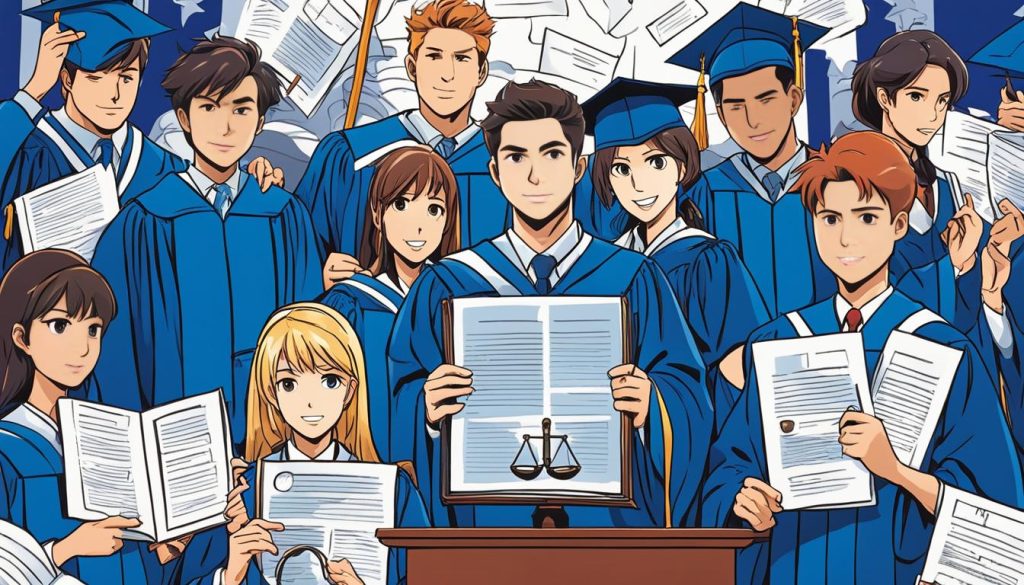Varsity Blues Scandal: Understanding the Impact
The Varsity Blues scandal rocked the world of college admissions in the United States when it was uncovered in 2019. This scandal, which involved parents paying bribes to secure admission for their children into prestigious universities, has had far-reaching consequences for college admissions and educational integrity. The impact of the Varsity Blues scandal is still being felt today, as universities and policymakers grapple with the fallout.
In this article, we will explore the impact of the Varsity Blues scandal on college admissions and educational integrity. We will also examine the key players involved in the scandal, the fraudulent practices that were uncovered, and the initial fallout from the scandal.
Key Takeaways
- The Varsity Blues scandal involved parents paying bribes to secure admission for their children into prestigious universities
- The scandal has raised questions about the fairness and integrity of the college admissions process
- The impact of the scandal is still being felt today, as universities and policymakers work to address the fallout
- The scandal has highlighted the need for greater transparency and accountability in college admissions
- Efforts are underway to prevent similar fraud in the future and restore public trust in higher education
The Varsity Blues Scandal: Unraveling the Truth
The Varsity Blues scandal was a large-scale college admissions fraud that involved wealthy parents bribing their children’s way into prestigious universities. Central to this scheme was Rick Singer, a private college admissions consultant who leveraged his connections to coaches and test administrators to get fake athletic profiles and inflated test scores. Bribes ranging from $15,000 to $500,000 were paid to coaches and administrators to secure admission, resulting in over 50 arrests and multiple universities implicated.
The scandal rocked the higher education community and highlighted deep-seated issues regarding corruption, privilege, and the erosion of meritocracy. The methods used by Singer and his clients to obtain admission were egregious, involving falsified athletic achievements, doctoring test scores, and creating fake identities.
“What Singer was selling was access to the most prestigious universities in the country,” said Andrew Lelling, the US Attorney for Massachusetts who led the prosecution of the case.
It emerged that many parents involved were increasingly desperate to ensure their children’s admission to top-tier universities, despite their lack of academic or athletic achievement. The bribery scandal ultimately called into question the integrity of the admissions system and tarnished the reputation of higher education.

The investigation into the scandal has prompted widespread calls for reforms to the college admissions process, advocating for increased transparency, greater scrutiny of admissions consultants, and the strengthening of internal controls.
Impact on College Admissions and Integrity
The Varsity Blues scandal has sent shockwaves throughout the American education system. It has raised serious questions about the fairness and transparency of the college admissions process, the erosion of meritocracy, and the loss of public trust in higher education. The scandal has shone a spotlight on the unethical practices carried out by some wealthy parents to get their children into elite universities in the US.
Many believe that the admissions system has long been rigged in favor of the wealthy and privileged. The Varsity Blues scandal has only served to reinforce this perception and has dealt a blow to the idea of meritocracy, where individuals are rewarded based on their abilities and achievements rather than their status or connections.
The scandal’s impact has been felt far beyond the individual universities involved. It has sparked a nationwide debate about the need to safeguard educational integrity and restore faith in the value and credibility of college degrees. The government has launched investigations into the admissions practices of universities and colleges across the country.
Following the scandal, several universities have taken steps to address the systemic issues that allowed such fraud to occur. Many have implemented more rigorous admissions procedures, increased transparency, and brought in external auditors to help ensure compliance. However, much more needs to be done to restore public trust and safeguard educational integrity.
Measures taken to address the issues
| University | Measures taken |
|---|---|
| University of Southern California (USC) | Instituted new controls requiring senior officials to approve all athletic admissions and mandating background checks for coaches hired externally |
| Yale University | Conducted a review of admissions policies and “strongly recommended” training for admissions officers on family contributions and how to identify signs of fraud |
| University of Texas at Austin | Undertook a full review of admissions processes and procedures, including the use of the “special talent” category and the level of oversight for such applications |
These measures represent a step in the right direction, but they are just the beginning. More needs to be done to ensure that the college admissions process is fair, transparent, and rewarding of merit. This requires not only institutional reforms but also a broader societal shift towards valuing education for its own sake rather than as a means to access privilege and power. Only then can we begin to restore public trust in higher education and safeguard educational integrity for future generations.

Conclusion
Overall, the Varsity Blues scandal has had far-reaching and severe consequences for the college admissions process and the educational system at large. The exposure of fraudulent practices has not only undermined the principles of meritocracy and fair competition but has also shattered the public’s trust in the credibility of higher education.
However, in response to the scandal, many universities and policymakers have taken concrete steps towards implementing reforms that aim to improve transparency and strengthen the integrity of the admissions system. These include increased scrutiny and oversight of the recruitment process, stricter guidelines for standardized testing, and the establishment of independent review panels.
Despite these efforts, the long-term implications of the scandal on the future of college admissions remain uncertain. It will take time and sustained efforts from all stakeholders to restore the public’s faith in the system and ensure that every student is given an equal chance to succeed based on their merit and hard work.
FAQ
What is the Varsity Blues scandal?
The Varsity Blues scandal refers to a high-profile college admissions fraud that came to light in 2019. It involved wealthy parents illegally securing admission for their children into prestigious universities through fraudulent means.
Who were the key players involved in the Varsity Blues scandal?
The key players in the Varsity Blues scandal included Rick Singer, the mastermind behind the scheme, wealthy parents, college coaches, and standardized test administrators.
What were the fraudulent practices uncovered in the Varsity Blues scandal?
The fraudulent practices in the Varsity Blues scandal included bribing college coaches, faking test scores, submitting false applications, and hiring individuals to take standardized tests on behalf of the students.
What was the initial fallout from the Varsity Blues scandal?
The initial fallout from the Varsity Blues scandal included indictments, arrests, resignations of college officials, and public outrage over the unfairness and lack of integrity in the college admissions process.
What impact did the Varsity Blues scandal have on college admissions?
The Varsity Blues scandal raised questions about the fairness and transparency of the college admissions system. It exposed the flaws in the meritocracy and eroded public trust in the integrity of the process.
How did the Varsity Blues scandal affect educational integrity?
The Varsity Blues scandal highlighted the ways in which financial privilege can undermine the principles of educational integrity. It revealed the extent to which some individuals are willing to cheat in order to gain an unfair advantage in college admissions.
What measures have been taken to address the issues raised by the Varsity Blues scandal?
In the wake of the Varsity Blues scandal, universities and policymakers have launched investigations into their admission processes, implemented reforms to prevent fraud, and increased transparency in the selection criteria.
What are the consequences faced by those involved in the Varsity Blues scandal?
The consequences faced by those involved in the Varsity Blues scandal include criminal charges, loss of reputation, and legal repercussions. Many individuals implicated in the scandal have also faced public scrutiny and career setbacks.
What reforms are being implemented to prevent similar fraud in the future?
To prevent similar fraud in the future, universities and policymakers are tightening security measures, conducting more thorough background checks, and increasing oversight of the admissions process. They are also improving collaborations between colleges, testing agencies, and high schools to detect and prevent fraud.
What are the long-term implications of the Varsity Blues scandal on the college admissions process?
The Varsity Blues scandal has led to a reassessment of the college admissions process, with calls for increased transparency, fairness, and equal opportunities for all students. It has also highlighted the need for ongoing vigilance and reforms to ensure the integrity of the system.
How can trust and integrity be restored in the college admissions process?
Restoring trust and integrity in the college admissions process will require ongoing vigilance, transparency, and accountability. Increased efforts to prioritize meritocracy, reduce financial influence, and ensure fair opportunities for all students can help rebuild confidence in the system.
